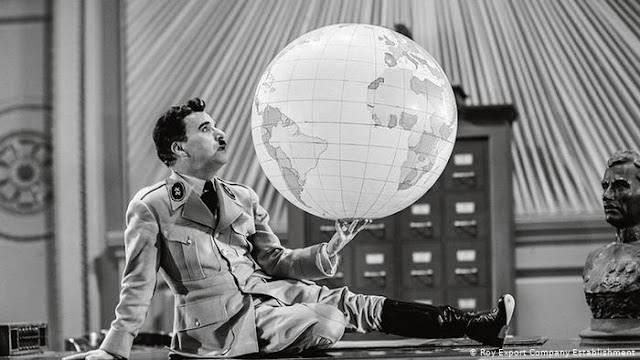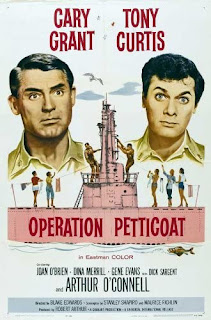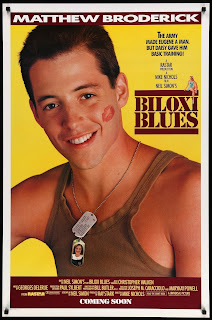*Last Updated: 1/1/2024
*This post is part of a film guide on World War II. Click here for the main page
*For more context on the process behind this guide, click here for an introduction
Introduction: How do you laugh about war? Even more so, how do you find humor in the most destructive war of all-time? In an odd quirk of human nature, it seems that one of our essential ways in dealing with horrifying realities is by identifying their ironies, contradictions, pretensions, and absurdities. How do you get your mind around the incomprehensible evil of a figure like Hitler or the dehumanization of the military machine? This category claims one vital way of doing so is by popping their pompous and self-important balloon through satire, irony, and insult. There are a few films I missed in this category (mostly due their only availability being to purchase on DVD or VHS), but it seems this category wouldn't quite fully mature until television and the Vietnam War. In general, it seems that Americans liked World War II to retain a certain serious nobility to it, but Korea and Vietnam were not so sacred. Perhaps one could argue that the greater the disconnect between the perceived righteousness of the conflict and the actual approval of the conflict the greater the need for humor to deal with it?
In order to get you to the thing most of you came for, "What's the best in this genre? I've put my recommendations for you below. Following that, if you'd like to learn more about the 10 films in this section, then you can find each film in this category organized by release date (oldest to newest) with a brief commentary, a link to its IMDB page, and my grade.
The Deep Dive: For those wanting a broader and richer journey...
Recommendations
The Top Shelf: Films like 1942's Casablanca and 1998's Life is Beautiful are great comedies that I have primarily located in other WWII categories: War backdrop and Holocaust respectively. In their absence, there is no true standout, just a lot of solid comedies. If pushed, I'd likely recommend 2019's Jojo Rabbit. Through some clever narrative framing, like viewing Hitler and the Nazi movement primarily through the eyes of a 10 year old German boy, the film is able to walk the thin line between finding the humor in the Nazi movement while also portraying the gravity of its horrors. It's easily the best WWII comedy of the last century.
The Deep Dive: For those wanting a broader and richer journey...
- The Great Dictator (1940): Charlie Chaplin's courageous and mostly excellent satire of Hitler, Mussolini, and Fascism.
- To Be Or Not To Be (1942) / (1983): Whether you are watching the original starring Jack Benny or the remake by Mel Brooks, it just plain works. The original is the better overall film, but Brook's take is much funnier.
Individual Film Commentary (Oldest to Newest)
- A+ = All-time Classic
- A = Excellent Film
- A- = Excellent Film, but some minor faults
- B+ = Very Good film
- B = Good Film
- B- = Good Film, but some key faults
- C+ = Average with some redeeming qualities, but major faults
- C = Mediocre Film
- C- = Poor Film
- D+ = Bad Film
- I don't usually rate anything lower
Individual Film Commentary (Oldest to Newest)
1. The Great Dictator (1940) IMDB
- The similar physical appearances between Charlie Chaplin and Adolf Hitler, two of the most popular figures in the world during the 1930's, was not lost on Chaplin who used the opportunity to satirize the dictator and bring a personal message to the world. That message came in the film The Great Dictator. It is Chaplin's first "talkie" film coming a few years after Chaplin's final silent "Tramp" film - 1936's Modern Times. Chaplin plays the role of a Jewish barber who has a striking resemblance to the country's dictator Hynckel (a stand-in for Hitler also being played by Chaplin). He lives in Tomania (a stand-in for Germany) just before the beginning of war as persecution against Jews begins to ramp up. The barber is captured and taken to camp as his friends and girlfriend make their way to live in Osterlich (stand-in for Austria I believe). Through a series of events, the Jewish barber is mistaken for the dictator and ultimately ends up giving a climactic speech about peace to end the film.
Chaplin handles the transition to "talkies" splendidly- mixing his physical silent comedy style with music, sound effects, and verbal jokes. A great example here is the classic sequence where the dictator Hynkel dances with the world globe. It's one of my favorite comedic sequences of all-time and one that that could have played in any silent era film and still stood out. However, the sequence is made better for the delicate musical score, the Hynkel cackle that begins it and the balloon pop sound that ends it. There's some great comedy little jokes sprinkled throughout the film, but the key satire themes here is the over-developed pride and ego of fascism. It's successful.
The film was ahead of its time and was a courageous effort from Chaplin and mostly succeeds as a satire of fascism, Hitler, and Nazism. The ending monologue is certainly engaging and uplifting, but it also bears a dated hope in the potential of some kind of universal secular humanism - the film equivalent of John Lennon's idealistic and philosophically naïve "Imagine". Still, it's a good comedy and a wonderful time piece to study. Give it a view. GRADE: B+
2. You Natzy Spy! (1940) IMDB
- This short 18 minute production featuring the 3 Stooges is the first major Hollywood production to make fun of the Nazi regime (it came out about 9 months before The Great Dictator). The stooges begin as wallpaper hangers and are enlisted by a few wealthy men to overthrow their monarchy and become the dictators of the country. The stooges end up leading the country with Moe as a kind of Hitler stand-in, Curly as Goering, and Larry as Goebbels. What follows is their usual slapstick and verbal sparring schtick with a couple little jokes hitting here and there. There's nothing really here that stands out as true comedic punches landed at the Nazi's and there's no jokes/sequences worth seeking this short out for. This is just a sub-par Stooges short that so happens to feature similarities to world leaders for topicality. GRADE: D+
3. To Be or Not To Be (1942) IMDB
- A group of Polish soldiers accidentally trust a German secret agent named Siletsky with the names and locations of their family members in the Polish underground. Polish soldier Sobinksi, played by Robert Stack, is charged with jumping into occupied Poland to stop Siletsky before he's able to get the list of names to the Gestapo. Sobinski entangles a Polish theatrical troupe headed by Maria and Joseph Tura, played by Jack Benny and Carole Lombard respectively. Benny provides the traditional comedy (I've always had a soft spot for Benny's humor) and Lombard plays things a bit more straight with a stinging humor that punches up nearly every scene she's in. This is my first time seeing Lombard and she's a fantastic - I think stealing every scene she is in. This was her last performance, she died in a plane crash the same year this film came out.
In order to trick Siletsky into handing over the list, the theatrical troupe pretends to be the Gestapo and meet with him. This is where much of the comedy comes from with Benny getting a chance to ham it up a bit with the "So they call me Concentration Camp Ehrhardt?" sequence being a standout in the film. There's more back and forth between the troupe and the Gestapo and it ultimately all ends with a trip from Hitler to the theater. While this is billed as a comedy, I'm surprised at how dramatic and suspenseful it gets. This is a good comedy that manages, like Casablanca, to float between drama, broad comedy, and a biting wit. It successfully satirizes the Nazi, especially the SS/Gestapo, without losing sight of their atrocities. A nice surprise find. GRADE: B+
4. Mister Roberts (1955) IMDB
- Thirty minutes into this two hour comedy and the only thing that has happened is we've been introduced to a bunch of bored sailors who remain behind the lines on a supply ship far away from any action. It's been dull and humorless. The lead officer is played by Henry Fonda, who is, god bless him, just not that funny. The ensign is played by Jack Lemmon in an over the top comedic role as the lazy but resourceful officer. The Captain, played by James Cagney, is played as crazy and out of touch. The comedy is supposed to come from how these sailors all try and keep their sanity on a boring supply ship with a crazy captain, but it all feels so forced, lifeless, and lacking moral sense. It isn't until about an hour in that the film moves locations and the men get to a port. I want to be kind to this film, but it's dated portrayals of natives, Animal House-lite portrayal of horny sailors, non-sensical Captain written to just be a nuisance, and humorless Fonda just doesn't work. It's a shame this all-star cast is working with material that just doesn't translate for me. GRADE: D+
5. Operation Petticoat (1959) IMDB
- It's December 1941 and Commander Sherman, played by Cary Grant, wants to get his submarine into the Pacific war. Unfortunately, his submarine is strafed by the Japanese forcing makeshift repairs, manned with an unusual officer, played by Tony Curtis, and saddled with five U.S. nurses who were left stranded on a Pacific island. Grant's Commander is the straight man here trying to manage all of these obstacles while getting his boat into the war. It's an interesting premise, but it doesn't just pay off like it should. For example, how could women and men coexist on a submarine? I mean in one scene when they are looking to take out a ship a nurse comes up to give the Commander his daily pill and accidentally hits the fire button! Other moments see men and women trying to use the shower at the same time or some necking happening or women putting their drying clothes in the engine room. Despite good direction and a strong effort from Grant, this just doesn't quite click like it should. GRADE: C
6. Catch-22 (1970) IMDB
- Hollywood has tried a couple of times to adapt Joseph Heller's famous novel - none have been all that successful in my opinion. The novel is a hilarious and insightful satire into the contradictions, ironies, and incompetents that the bomber pilot Yosarrian encounters during World War II. Bomber crews were required to fly a certain number of missions before they were allowed to leave the front lines. The catch is that if you knew the casualty rate of a mission was 10% or more, than doing 20-25 missions means you likely don't have a chance of ever returning. Crew never knew when their aircraft would get it and this led to lots of anxiety and breakdowns. To get out of missions, crew would claim all sorts of issues. A key example of the comedy and irony identified by the novel is that if a crew complained to the doctor that they were insane with nervousness and anxiety and couldn't go on a mission, this was actually a sign that they were sane (who wouldn't be nervous) and were cleared to go on a mission.
Anyways, the movie is anchored by Alan Arkin's Yosarrian and it's...okay. There are nice moments, but many of the best moments and characters from the novel just don't hit with the same humor or insight in the film. If you'll never read the book, then this film is a poor substitute. I might even recommend just staying away from it at all unless you are really curious. GRADE: C+
7. 1941 (1979) IMDB
8. To Be or Not To Be (1983) IMDB
- An adaptation (made much more straight up comedic) of the 1942 classic that appears earlier on this list and Mel Brooks knocks a solid homerun here. The German invasion of Poland brings the Nazi's into Warsaw and a game of cat and mouse between the Gestapo and Polish underground ensures. Caught between them is a troupe of Polish actors, headed by the couple of Mel Brooks and Anne Bancroft, allowing for lots of madcap back and forth with disguises and subterfuge aplenty. There's a kind of Marx brothers feeling to some of the scenes here, but the humor is unmistakably of Brooks' oeuvre. A solid comedy that moves fast while flinging lots of jokes and comedic situations at the screen. It doesn't match the heights of Brooks' Young Frankenstein for me, but I'd say this is probably his second best overall comedy. This is straight up funnier than the original, but the original is a better overall film. GRADE: B+
9. Biloxi Blues (1988) IMDB
- Based on Neil Simon's play, Biloxi Blues tells the story of young recruits from New Jersey going through WWII basic training in Biloxi, Mississippi. It's a leisurely film, taking its time to introduce characters like Matthew Broderick's Eugene, the intelligent but young and naïve writer. The young platoon runs struggles through basic training under the watchful eye of Christopher Walken's drill Sgt. Toomey. Walken is able to take the stock "tough" Sgt. and give it his own spin - mixing a kind of wit in his punishments that set him apart from the more yell and scream type.
It's based on a play so the film comes down to a handful of mostly self-contained sequences. The whole thing is pretty uneven, some pretty funny stuff and some dramatic stuff that doesn't quite work. There's a sequence when all the men are in the barracks and they are sharing fantasies about their last week alive and the personalities all shine and come through. For a couple of minutes, every character is likable, interesting, and well - just human beings enjoying each other in the midst a crappy basic training experience. It's a lovely moment. However, there's also an odd dramatic ending with a drunken drill Sgt. that doesn't ever work like the film wants it to. In the end, it has some moments, but the whole never quite gels together as a story. GRADE: C+
10. Jojo Rabbit (2019) IMDB
- The interesting conceit of this film (what makes it a comedy with social commentary) is to view Hitler and the Nazi movement through the eyes of a 10 year old boy. Through the eyes of ten-year old Jojo, there is no one cooler than Adolf Hitler, and being part of the Hitler youth is like being part of the cool kids club. This idea is hilariously introduced in the beginning of the film as Jojo is given a pep talk on how to Heil by an imaginary Hitler (who visits him) - it gets him so amped up he runs around the town heiling everyone to the tunes of "I Want to Hold Your Hand" by the Beatles. This conceit allows us to see how easily youths could be swept up into such a fervor. In particular, the film takes aim at how hatred and fear of Jews could take hold in our minds.
At a Hitler Youth weekend, Jojo sits and listens to a presentation of how evil the Jews are as the kids suggest more evil ways to depict them, "...with a serpent's tongue!" To a child, why not trust the adults telling them this. Later, when a Jewish girl finds a hiding place in Jojo's house, Jojo is forced to confront his view of Jewish people (and build up his courage) and the fact his mother is complicit in hiding the Jews. Essentially, this film is an examination of the massive influence father and mother figures play in our development. In striving to be more than just a comedy, the film sets a pretty tough balancing act with tone - too comedic and the meaningful stuff doesn't work, too serious and the comedic stuff doesn't work. Thankfully it mostly pulls off that balance well and becomes quite an effective piece of dramedy. GRADE: B+













Comments
Post a Comment